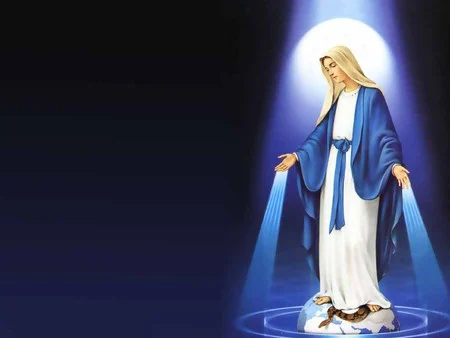Cyril Vollert SJ (1965) aptly describes that, when Mary accepted the Angel’s message and bore the Word made flesh, she became not only the Mother of God in the physical realm but also the spiritual mother of all believers united under the headship of her divine Son. This union means that as members of the Church, we form a single mystical entity with Christ, who is the Son of Mary.
Mary’s unwavering trust and obedience, particularly evident in the Gospel of Luke, make her the perfect archetype for all Christians to emulate. Luke tells us that “Mary kept in mind all these things, pondering them in her heart” (2:19). Her steadfast commitment to “Trust and Obedience” serves as an inspiration and reference point for believers worldwide.
The depth of Mary’s trust and obedience is fascinating. At the Annunciation, Mary faced a pivotal question: “Will you help the Saviour’s coming by becoming a mother?” In a moment of initial perplexity, Mary replied, “Let it be done according to thy word.” Her response exemplifies trust, as she placed her faith in the Angel’s words despite her confusion. Max Thurian (1964) notes that, Mary’s faith is fundamentally an act of trust, saying, “Let it be unto me according to thy word”. Mary’s obedience began with listening to the Word of God and continued with her prayer, “Lord, teach me your ways,” ultimately leading her to stand at the foot of the Cross.
Ancient documents suggest that Mary had royal lineage, descending from both the Kingdom and the Priesthood, making her a descendant of David and Aaron. She served at the sanctuary until Joseph was chosen to marry her through the casting of lots. Mary also understood the consequences of adultery and fornication under the law, which included stoning to death. Yet, despite her awareness of these complexities, she displayed profound trust and courage by saying “Yes” to God’s plan of Redemption.
Mary’s obedience led her to the Cross, where she shared in her Son’s suffering, an embodiment of her obedience to God’s will. Her willingness to accept John as her son, replacing her biological son, exemplifies her trust in the Lord’s plan. Mary teaches us that to find true peace and freedom, we must obediently follow the Word of God, even when faced with suffering.
In conclusion, Mary’s life teaches Christians that, we must draw near to Jesus and be prepared to stand with Him at the Cross. Without Christ crucified, our efforts are in vain. Thus, we are called to submit ourselves entirely to God’s will, just as Mary did. Her life is a testament to trust and obedience, and we are called to emulate her example.
REFERENCES
Hickey, J. C. (1988). Mary at the foot of the Cross. San Francisco: Ignatius Press.
Maas, A. (1912). The Blessed Virgin Mary. In The Catholic Encyclopedia. New York: Robert Appleton Company. Retrieved April 26, 2010 from New Advent: http://www.newadvent.org/fathers/0847.htm
The Protoevangelium of James: Translated by Alexander Walker. From Ante-Nicene Fathers, Vol. 8. Edited by Alexander Roberts, James Donaldson, and A. Cleveland Coxe. (Buffalo, NY: Christian Literature Publishing Co., 1886.). Revised and edited for New Advent by Kevin Knight. http://www.newadvent.org/fathers/0847.htm
Thurian, M. (1964). Mary, Mother of All Christians. New York: Herder and Herder.
Vollert, C. S.J. (1965). A Theology of Mary. New York: Herder and Herder.





